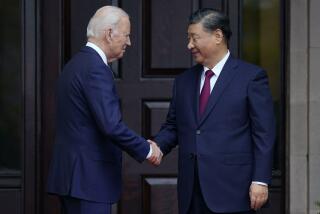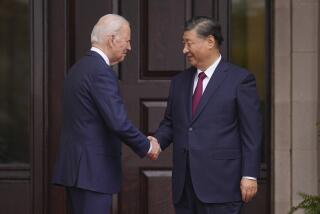Clinton, China Official to Meet as Trade Deadline Nears : Diplomacy: The White House refuses to discuss unannounced meeting with Zou Jiahua. It may be last high-level talk before a decision on trade benefits.
- Share via
WASHINGTON — A senior Chinese emissary will have an unannounced White House meeting with President Clinton today in what will probably be the last high-level talks before the Administration decides whether to renew China’s trade privileges in this country, senior officials said Sunday.
The visitor is Chinese Vice Premier Zou Jiahua, who arrived in Washington over the weekend. For the last week, Zou has been traveling in Canada and elsewhere in the United States, and was present at former President Richard Nixon’s funeral in Yorba Linda.
The White House refused to say anything about Zou’s meeting with Clinton or what its purpose is. But it is the latest sign that there may be some high-level secret diplomacy under way between the United States and China as Clinton nears a June 3 deadline for deciding what to do about China’s trade benefits.
Over the last few weeks, the Administration has been showing signs of increasing volatility and nervousness in its dealings with the Beijing government. On Saturday, the Administration apparently reversed a decision reached the previous day by putting off plans to target China on the separate trade issue of pirating U.S. movies, music and software.
“We’re in a very delicate time in terms of our engagement with China,” U.S. Trade Representative Mickey Kantor observed over the weekend.
Zou is in a position to tell the Administration how much the Beijing government intends to do over the next few weeks to satisfy U.S. complaints about China’s human rights policies.
For example, Zou could tell the White House officially, as other Chinese emissaries have informally, that China will finally stop its jamming of Voice of America broadcasts inside China. And Zou might be able to tell the Administration whether the Chinese regime intends to release any more political prisoners.
For his part, Clinton will have a chance in the meeting with Zou to tell the Chinese government directly whether he plans to cut back on China’s trade benefits this year and whether he plans to phase out the linkage between human rights and trade privileges in coming years.
Like almost all other countries, China enjoys “most favored nation” trading benefits, which permit Chinese products to be exported to this country under low tariff rates.
In the years after the 1989 Tian An Men Square crackdown, Congress repeatedly passed legislation that would have required China to improve the human rights climate to win annual renewals of MFN, but former President George Bush always vetoed such legislation.
During his 1992 presidential campaign, Clinton heaped criticism upon Bush for “coddling dictators” in Beijing.
After coming to the White House, Clinton issued an executive order spelling out a series of human rights improvements that China should make in order to keep receiving MFN benefits.
However, throughout the last year, the Administration has had trouble persuading the Chinese regime that it is serious about the threat to revoke trade benefits.
Chinese officials, such as Premier Li Peng, have said repeatedly that they do not believe the United States will revoke MFN status for China because such action would hurt U.S. companies as well as Chinese ones.
Over the last two months, the Chinese regime has seemed to be going out of its way to adopt a defiant posture toward the United States and other Western countries.
Chinese security officials rounded up dissidents during visits to Beijing by Secretary of State Warren Christopher and by French Premier Edouard Balladur.
The Clinton Administration has been exploring a number of options for cutting back partially on China’s trade benefits without revoking them entirely. For example, one possibility would be to lift the MFN trade privileges for China’s state-run enterprises but to preserve the benefits for private enterprises.
“There’s a lot of contingency planning for a lot of potential outcomes,” one senior U.S. official said Sunday.
Ordinarily, Zou would be an unlikely candidate to be handling what could be the future of relations between China and the United States. He is responsible for Beijing’s state planning apparatus, the still-socialist elements in the Chinese economy.
But Zou is a useful emissary because he enjoys close ties to the more conservative elements of China’s leadership. He is closely identified with Chen Yun, the octogenarian leader who ranks as the second most senior figure in the Chinese Communist Party after the ailing Deng Xiaoping.
Zou will be the first senior Chinese official whom Clinton has met since he held talks with Chinese President Jiang Zemin in Seattle last November.
More to Read
Sign up for Essential California
The most important California stories and recommendations in your inbox every morning.
You may occasionally receive promotional content from the Los Angeles Times.










